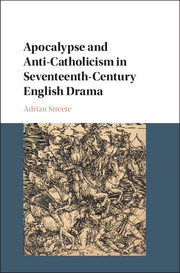41 results
Situating performance in early modern England
-
- Journal:
- British Catholic History / Volume 35 / Issue 1 / May 2020
- Published online by Cambridge University Press:
- 08 April 2020, pp. 85-93
- Print publication:
- May 2020
-
- Article
- Export citation
8 - Sin and Evil
-
-
- Book:
- The Cambridge Companion to Shakespeare and Religion
- Published online:
- 12 April 2019
- Print publication:
- 28 March 2019, pp 118-133
-
- Chapter
- Export citation
The Bible and the Printed Image in Early Modern England: Little Gidding and the Pursuit of Scriptural Harmony. Michael Gaudio. Visual Culture in Early Modernity 52. London: Routledge, 2017. x + 196 pp. $150.
-
- Journal:
- Renaissance Quarterly / Volume 71 / Issue 4 / Winter 2018
- Published online by Cambridge University Press:
- 14 January 2019, pp. 1477-1479
- Print publication:
- Winter 2018
-
- Article
- Export citation
Chapter 7 - Titus Andronicus and the Rhetoric of Lamentation
- from III - Interplay:
-
-
- Book:
- The Bible on the Shakespearean Stage
- Published online:
- 17 April 2018
- Print publication:
- 26 April 2018, pp 121-139
-
- Chapter
- Export citation
Contents
-
- Book:
- Apocalypse and Anti-Catholicism in Seventeenth-Century English Drama
- Published online:
- 30 August 2017
- Print publication:
- 17 August 2017, pp vii-vii
-
- Chapter
- Export citation
Chapter 1 - Antichrist and the Whore in Early Modern England
-
- Book:
- Apocalypse and Anti-Catholicism in Seventeenth-Century English Drama
- Published online:
- 30 August 2017
- Print publication:
- 17 August 2017, pp 24-58
-
- Chapter
-
- You have access
- HTML
- Export citation
Introduction
-
- Book:
- Apocalypse and Anti-Catholicism in Seventeenth-Century English Drama
- Published online:
- 30 August 2017
- Print publication:
- 17 August 2017, pp 1-23
-
- Chapter
-
- You have access
- HTML
- Export citation
Chapter 4 - ‘Occultus Rex’
-
- Book:
- Apocalypse and Anti-Catholicism in Seventeenth-Century English Drama
- Published online:
- 30 August 2017
- Print publication:
- 17 August 2017, pp 122-163
-
- Chapter
- Export citation
Chapter 6 - ‘Rebellion Orthodox’
-
- Book:
- Apocalypse and Anti-Catholicism in Seventeenth-Century English Drama
- Published online:
- 30 August 2017
- Print publication:
- 17 August 2017, pp 199-239
-
- Chapter
- Export citation
Chapter 5 - ‘Purple Pride’
-
- Book:
- Apocalypse and Anti-Catholicism in Seventeenth-Century English Drama
- Published online:
- 30 August 2017
- Print publication:
- 17 August 2017, pp 164-198
-
- Chapter
- Export citation
Chapter 2 - ‘What News from Babylon?’
-
- Book:
- Apocalypse and Anti-Catholicism in Seventeenth-Century English Drama
- Published online:
- 30 August 2017
- Print publication:
- 17 August 2017, pp 59-93
-
- Chapter
- Export citation
Copyright page
-
- Book:
- Apocalypse and Anti-Catholicism in Seventeenth-Century English Drama
- Published online:
- 30 August 2017
- Print publication:
- 17 August 2017, pp iv-iv
-
- Chapter
- Export citation
Dedication
-
- Book:
- Apocalypse and Anti-Catholicism in Seventeenth-Century English Drama
- Published online:
- 30 August 2017
- Print publication:
- 17 August 2017, pp v-vi
-
- Chapter
- Export citation
Note on Texts and Terminology
-
- Book:
- Apocalypse and Anti-Catholicism in Seventeenth-Century English Drama
- Published online:
- 30 August 2017
- Print publication:
- 17 August 2017, pp xi-xii
-
- Chapter
- Export citation
Index
-
- Book:
- Apocalypse and Anti-Catholicism in Seventeenth-Century English Drama
- Published online:
- 30 August 2017
- Print publication:
- 17 August 2017, pp 279-289
-
- Chapter
- Export citation

Apocalypse and Anti-Catholicism in Seventeenth-Century English Drama
-
- Published online:
- 30 August 2017
- Print publication:
- 17 August 2017
Chapter 3 - ‘Mere Idolatry’?
-
- Book:
- Apocalypse and Anti-Catholicism in Seventeenth-Century English Drama
- Published online:
- 30 August 2017
- Print publication:
- 17 August 2017, pp 94-121
-
- Chapter
- Export citation
Acknowledgements
-
- Book:
- Apocalypse and Anti-Catholicism in Seventeenth-Century English Drama
- Published online:
- 30 August 2017
- Print publication:
- 17 August 2017, pp viii-x
-
- Chapter
- Export citation
Select Bibliography
-
- Book:
- Apocalypse and Anti-Catholicism in Seventeenth-Century English Drama
- Published online:
- 30 August 2017
- Print publication:
- 17 August 2017, pp 261-278
-
- Chapter
- Export citation
Conclusion
-
- Book:
- Apocalypse and Anti-Catholicism in Seventeenth-Century English Drama
- Published online:
- 30 August 2017
- Print publication:
- 17 August 2017, pp 240-260
-
- Chapter
- Export citation



